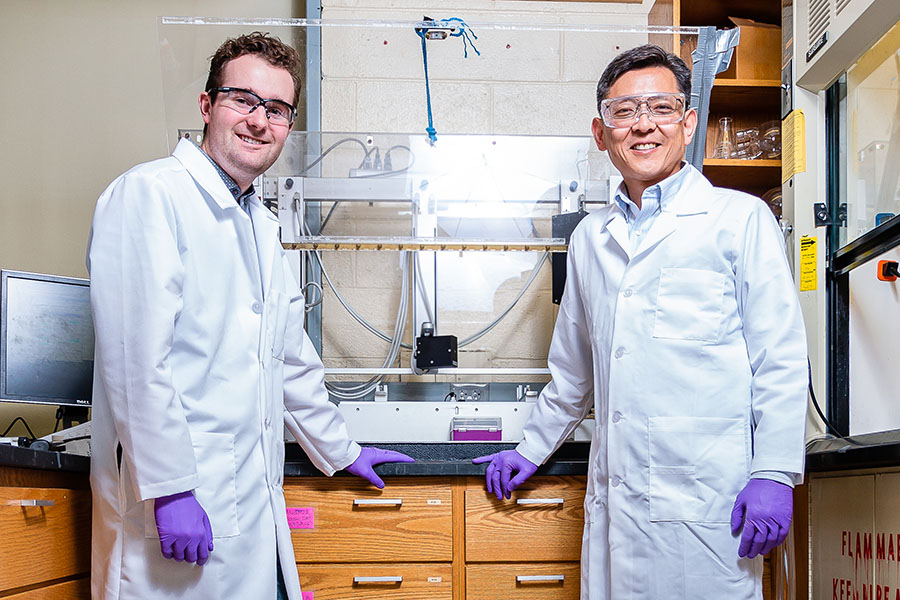Purdue Chemical Engineering-affiliated startup awarded NSF funding to advance ARDS treatment technologies
 Spirrow Therapeutics, a startup cofounded by Purdue chemical engineers, was recently awarded a $256,000 Small Business Technology Transfer (STTR) Phase I grant from the National Science Foundation (NSF).
Spirrow Therapeutics, a startup cofounded by Purdue chemical engineers, was recently awarded a $256,000 Small Business Technology Transfer (STTR) Phase I grant from the National Science Foundation (NSF).
The project, Polymer Surfactant Therapy for Acute Respiratory Distress Syndrome (COVID-19), will be conducted in partnership between Spirrow Therapeutics and the laboratory of Professor You-Yeon Won in the Davidson School of Chemical Engineering at Purdue University.
Spirrow Therapeutics was founded in 2018 by Won and his former students, Davis Arick and Kyle Kim, to improve the quality of care for patients suffering from severe respiratory conditions that lack therapeutic treatment options, with an initial focus on Acute Respiratory Distress Syndrome (ARDS).
ARDS is a lung injury condition of acute onset characterized by pulmonary edema and hypoxemia. Described by sufferers as drowning from within, ARDS causes deactivation of the lungs’ natural surfactant, collapsing the alveoli. The result is impaired blood oxygenation and multi-organ failure, with a mortality rate around 40%.
The team will conduct research that goes beyond the supportive role of current respiratory distress treatments to secure better outcomes for ARDS patients using novel Polymer Lung Surfactants (PLS), which is intertwined the current COVID-19 pandemic. Won and his students have developed biocompatible Polymer Lung Surfactants that can safely mimic the behavior of natural lung surfactant without being susceptible to the deactivation mechanisms introduced by ARDS. Polymer Lung Surfactants work by replacing the impaired natural lung surfactant at the interface in the deep lungs. They restore and maintain alveolar structure, allowing adequate blood oxygenation to resume while also reducing the mechanically induced damage that inherently results from ventilator assisted breathing.
Highly contagious viral infections, such as influenza or COVID-19, are common causes of pneumonia, which can develop into ARDS.
“The Spirrow team is very proud of this award, because SBIR/STTR awards are granted by the NSF based on a very competitive and rigorous evaluation process, just like for regular NSF grants,” said Won.
This STTR grant will help Spirrow toward achieving some critical preclinical research milestones, including proof-of-concept experiments in a wider range of animal models, formulation/dose optimization, and manufacturing scale-up.
About Dr. You-Yeon Won
Dr. Won joined Purdue Chemical Engineering in 2003. The overarching theme of his research has been to extend the knowledge in the field of polymer and colloid/interface science to help solve problems faced in improving human health. Specifically, over the past several years, Dr. Won’s research has focused on developing and studying (1) synthetic pulmonary surfactants for treatment of respiratory failure, (2) radio-luminescent theranostic agents for cancer treatment, and (3) sequence-controlled polymers for controlled release of bioactives. Learn more about Dr. You-Yeon Won: https://bit.ly/Purdue-ChE-Won.
About Spirrow Therapeutics
Spirrow Therapeutics is a pulmonary intensive care company focused on helping patients with Respiratory Distress Syndrome (RDS) survive. Their mission is to dramatically improve overall quality of care by reducing: mortality; morbidity (long-term complications); and time in intensive care. Spirrow Therapeutics has developed a first-in-kind therapeutic in the form of a nano-polymer surfactant that restores lung function and prevents multi-organ failure. As a fast-acting liquid, this therapeutic is delivered to the lungs directly through the trachea, bypassing the upper airway. Engineered to be immune to deactivation by ARDS, the therapeutic proceeds to restore and maintain the structure of collapsed air sacs (alveoli) deep in the lungs so that adequate blood oxygenation can resume until the body is able to heal on its own. Learn more at www.spirrowtherapeutics.com.
Source: Dr. You-Yeon Won, yywon@purdue.edu; Davis Arick, davis.arick@spirrowtherapeutics.com
Writer: Jennifer Merzdorf, jmerzdo@purdue.edu
